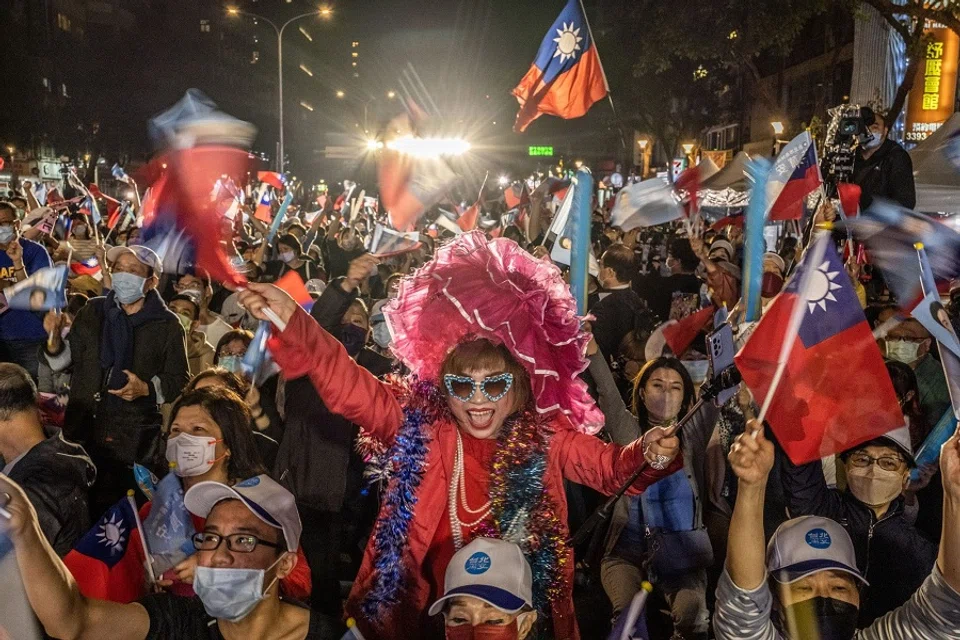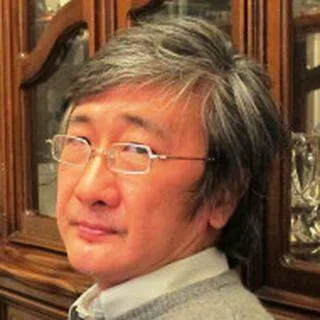Taiwan's 2024 presidential race takes shape
Taiwan's ruling Democratic Progressive Party took a number of hits during the "nine-in-one" local elections and Taiwan President Tsai Ing-wen resigned as a result. Veteran journalist Gu Erde notes how the 2024 presidential race has started to take shape, but Taiwan's elections in recent years show that voters' tastes, especially those of the young voters, change quickly and drastically.

Taiwan's ruling Democratic Progressive Party (DPP) suffered a major defeat in the "nine-in-one" local elections. With the loss of Taoyuan, Hsinchu and Keelung, the DPP's holding went from three special municipalities to two (Kaohsiung and Tainan); and four counties and cities to three (Pingtung, Chiayi and Penghu counties).
The local elections are like a "midterm examination" for the ruling party, where post-election changes to the political landscape would affect the 2024 presidential election.
Taiwan President Tsai Ing-wen announced her resignation as DPP chair to take responsibility for the party's poor showing in the local elections, setting off a wave of accountability and power restructuring within the party.
The DPP has long been co-ruled by various factions, and Tsai's faction is bound to be challenged following the party's poor performance.
Politicians held accountable for loss
Tsai had directed the nomination of various mayoral candidates during the local elections. In particular, she transferred former Hsinchu mayor Lin Chih-chien, whose two-term limit was about to expire, to Taoyuan, and continued supporting him even amid plagiarism allegations. Lin was eventually forced to step down to take responsibility for the building flaws of the Hsinchu Baseball Stadium, and withdraw from the electoral race. He was held accountable for the DPP's defeat in Hsinchu and Taoyuan.

The DPP has long been co-ruled by various factions, and Tsai's faction is bound to be challenged following the party's poor performance. Former Taipei City chapter chair Huang Cheng-kuo, who was once identified as a gangster by the police, had strongly supported Tsai and helped the DPP achieve favourable electoral results in Taipei. Huang was valued by Tsai and even appointed as a national policy adviser.
During the electoral battles this year, KMT Taipei mayoral candidate Wayne Chiang Wan-an raised the issue that Huang could become the "underground mayor" should DPP Taipei mayoral candidate Chen Shih-chung win. Indeed, Huang will most likely be held accountable for the DPP's defeat in Taipei.
Uncouth ways of local governments and their backers
Apart from the DPP's alleged ties to the underworld, Miaoli council speaker Chung Tung-chin, a long-time member of the KMT, was also convicted of causing a fatal injury in 1988. Chung had registered independently after losing a bid for the party's nomination and went on to win the county's magistrate election, becoming the first county magistrate with a triad background.

In addition, Hsu Tien-sung, who chaired the Nantou City Representative Council for two terms and is the father of KMT Nantou county commissioner Hsu Shu-hua, was also accused of having ties with the underworld by Tsai Pei-hui, the younger Hsu's competitor from the DPP. However, Hsu Shu-hua assured voters that her father had turned over a new leaf after his release from prison.
... just as [DPP's] Cheng was about to complete his two terms in office and pass the baton to his successor, the local forces decided to return to the embrace of the KMT instead of supporting Cheng's successor.
Such a toxic ecology remains a complex problem in Taiwan's politics. Tsai said in a speech after the election that the island has yet to break the existing local government structure and that there is still a big gap between the operations of the local governments and the people's expectations.

In fact, this problem not only plagues the counties and cities that are still under the KMT's control, but is also prevalent in Taoyuan, which the DPP has governed for eight years. Under Taoyuan mayor Cheng Wen-tsan, the special municipality had adopted a "benefit distribution model" similar to the KMT's, and successfully won the support of local KMT politicians. However, the political structure remained the same. Thus, just as Cheng was about to complete his two terms in office and pass the baton to his successor, the local forces decided to return to the embrace of the KMT instead of supporting Cheng's successor.
The next presidential candidates
How will the local elections affect the presidential election? If there are no surprises, Taiwan Vice-President William Lai Ching-te is set to become the DPP's next presidential candidate. Four years ago, Lai had already challenged Tsai to the party's presidential candidate nomination. He is also supported by New Tide, the DPP's largest faction, and has actively built an international network for himself in recent years, paving the way for his presidential candidacy. He is expected to gain greater influence in the party in the year ahead.
Meanwhile, KMT chair Eric Chu Li-luan has always been ambitious, and the party's major success in the local elections will only strengthen his intention to join the presidential race. However, Chu's contribution to the outcome in the local elections remains a question because his candidate nominations caused intra-party conflicts in Taoyuan, Hsinchu and Miaoli. Evidently, the electoral outcome can be considered more of a setback for the DPP than a big win for the KMT.

Re-elected New Taipei mayor Hou You-yi is another formidable presidential contender of the KMT. Despite a less controversial background, if he were to run for president just after winning a second term as mayor, he may suffer the same fate as then Kaohsiung mayor Han Kuo-yu who did the same thing. Furthermore, with his limited involvement in cross-straits and international issues, does Hou have the presidential quality to address global topics? This remains a question for many voters.
Also, Chao Shao-kang, a self-proclaimed "blue fighter" who aligns with the deep blue and is pro-China, will certainly fan the flames during the KMT's presidential nominations to lead the political situation. Hence, the battle to become the KMT's presidential nominee will be more intense than the DPP's.
Terry Gou and Ko Wen-je have similar views on cross-strait issues, as Gou's business is based in mainland China, while in recent years Ko has advocated "one family across the strait", through exchanges with Shanghai.
A rising third force?
In its first local elections since inception, Taiwan People's Party (TPP) led by outgoing Taipei mayor Ko Wen-je made a good showing. It put forward 86 candidates, winning Hsinchu and 14 seats across Taiwan, marking a win rate that is neither high nor terrible.

Despite losing Taipei, independent candidate Huang Shan-shan, who was supported by Ko, had a decent vote share of 25%. Voter turnout across Taiwan was low, and the blue and green camps were expected to vote according to their affiliations, which would leave almost no room for Huang. However, Huang managed to snag swing voters as well as some marginal blue and green voters, amid a 64% voter turnout in Taipei - a slight decrease from last year's 66%.
Kao Hung-an's win in Hsinchu was the biggest victory for "Ko's army", even amid allegations of fraud and profiteering. Apart from her personal qualities and Ko's aura, Kao was also endorsed by Hon Hai founder Terry Gou. After the election, Ko's assistant and TPP election coordinator Tsai Pi-ru started to promote a partnership between Gou and Ko in the presidential election, claiming that this third force would be the strongest pairing. Indeed, Gou and Ko have similar views on cross-strait issues, as Gou's business is based in mainland China, while in recent years Ko has advocated "one family across the strait", through exchanges with Shanghai.

Mainland China has always been a crucial factor in Taiwan's elections. Beijing did not directly intervene in the local elections, but prior to the elections Yazhou Zhoukan magazine - which has become increasingly pro-China in recent years - reported that the elder son of Ker Chien-ming, coordinator of the DPP Caucus in the Legislative Yuan, had business dealings with third-generation descendants of Chinese Communist Party members. Ker is a renowned figure in Hsinchu and a mentor to former Hsinchu mayor Lin Chih-chien. Naturally, the timing of Yazhou Zhoukan's report had an impact on the results in Hsinchu.
Apathy from young voters
During the election, Tsai called on the Taiwanese to come together and support one another. She said, "This is not just a round of local elections, but a message we are sending to the world."

What kind of message? She did not say. Many believed that the DPP was playing the "resist China, protect Taiwan" card again, and garnering votes by inciting a sense of a Taiwan in crisis. In fact, the DPP did not fully use this tactic. A survey in August by the Institute of Sociology at the Academia Sinica on the "China effect" showed a slight drop in support for resisting China and protecting Taiwan, while there was also a drop in the proportion of respondents who believed Taiwan could withstand a military offensive by mainland China as compared with last year. Amid such a climate, there is not much of a market to sell a sense of crisis.
The apathy of young voters is another consideration. When Tsai won the 2020 presidential election with a record vote share, young voters were seen to be the driving force. That year, 70% of voter turnout was made up of those aged 40 and below, as compared with less than 60% in 2016. The anti-extradition movement in Hong Kong and Xi Jinping's comments about "one country, two systems" whereby Taiwan would become a special administrative region of the People's Republic of China, definitely spurred political participation among youths.
There are no firm figures yet on the young voters' turnout this year, but two points give a clue. First, in recent years student groups have organised discounted train tickets and chartered shuttle buses for students to go home and vote during election seasons. But this year, with few people wanting to make the trip, the bus frequencies were reduced or even cancelled. Second, during the weekend before the elections, the various camps held walkabouts or rallies, including DPP Taipei mayoral candidate Chen Shih-chung - while there were many people in that large contingent, most of them were aged 50 and above, with few young people in sight.

Alongside this election was a constitutional referendum to lower the voting age from 20 to 18 years old. This was the first time Taiwan held a public review to change the constitution, and the threshold of half of the eligible votes, or 9.65 million, was needed to pass the referendum - only 5.6 million voted in favour.
Taiwan's elections in recent years show that voters' tastes change quickly and drastically.
The proposed amendments possibly did not pass because it would also lower the minimum age for candidacy from 23 to 18 years old, and many people believe that 18 is too young for candidacy. In fact, if the referendum was passed, the Legislative Yuan would still adjust the relevant laws to regulate the age for candidacy, such as according to the Presidential and Vice Presidential Election and Recall Act, where the minimum age for the presidency and vice presidency is 40 years old.
Taiwan's elections in recent years show that voters' tastes change quickly and drastically. The 2024 presidential election may also see very different choices from voters, based on what happens in the next year.



![[Photos] Fact versus fiction: The portrayal of WWII anti-Japanese martyrs in Taiwan](https://cassette.sphdigital.com.sg/image/thinkchina/3494f8bd481870f7c65b881fd21a3fd733f573f23232376e39c532a2c7593cbc)

